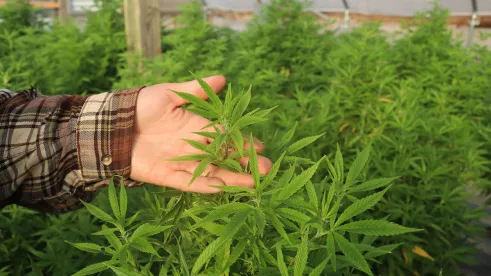Several members of our Hemp Law team attended the Industrial Hemp Summit in late February.
The annual event is typically held in person at the Institute for Advanced Learning and Research in Danville, Virginia. This year, the event was largely a virtual gathering, but it delivered the same level of high-quality education, engagement, energy, and excitement as in years past.
Common Ground for Success
All panelists and presenters seemed to agree: industry participants and trade groups can, and should, continue to find unity and common grounds for collaboration without letting perfection or competition get in the way of collective progress. It is incredibly difficult to find true success by walking alone in business, and no business or association is capable of effectively leading in every facet of the industry. We each play a role in helping to promote professionalism and transparency within the industry, and we must continue to hold ourselves and our friends accountable to the highest standards of excellence and safety. There is much we can learn by regularly communicating with others, by learning from and applying our own lessons from the past, and by finding and promoting collective agenda and ideas throughout the industry as a whole.
Cannabinoids Continue to Lead…
Cannabinoids are still the driving force in the industry today. With oversupplies remaining in the plant biomass and intermediate products markets, it will be more important than ever for growers and processors to appropriately scale their businesses, focus on the right plant genetics, and hone in their costs, skills, and efficiencies in operations. There is also still much work to be done on standardized practices for labs and testing across the industry, but the Southeast Hemp Association, Inc. and other groups are already collaborating in an effort to create and adopt "best practices" for consistent and standardized results and reporting. Minor cannabinoids are picking up steam among many businesses, but consumer education and adoption need to follow for sustained growth in those markets. Craft hemp flower, where allowed, continues to enjoy a vibrant market and there is still room for additional brands to develop. And Delta-8 THC continues to drive product sales, discussions, and concerns within the industry as a whole.
…But Fiber and Food are Accelerating
These products, supply chains, and markets are still developing. And there will inevitably be new challenges and obstacles for businesses to overcome in the food and fiber sectors. But new entrants are joining the efforts to create a sustainable, viable American market for these products. Hemp fiber and industrial usage products have a bright future. Hemp fiber market drivers like TS Designs are pushing to develop "dirt to shirt" supply chain strategies. And hemp food products continue to see expanding sales and real opportunities for market gains and traction, with firms like Victory Hemp Foods capitalizing on growing "flexitarian" dietary preferences among American consumers. Many others are working to identify and advance those opportunities across the country, like the Hemp Feed Coalition's efforts to expand hemp into animal feed markets.
Hemp is an American Story
Hemp has the power to reinvigorate sectors of American industry, bringing new life back to rural American farmers and communities. The crop and its products are not a cure-all for all American farming and economic woes. But, with hard work and collaboration, we can create an independent system for American hemp that is not beholden to foreign entities and markets for its supply chain and support. Now is the time for our industry to pull together, tell our story, and make real advancements on the legal and regulatory challenges we face.
One way of funding efforts to tackle those challenges and market the American hemp story is a national checkoff program. The National Industrial Hemp Council and Hemp Industries Association are investigating the viability of a checkoff program for our industry, and public feedback from hemp growers and businesses is essential in that process. Checkoffs are not without their own unique challenges, but can create significant advantages and benefits for us all if used and overseen correctly.
Challenges and risks remain, but the future is still bright for hemp and the industry is well-positioned for continued growth. As legal and regulatory foundations continue to settle and develop, it is imperative that hemp participants of all kinds – cannabinoid, industrial, or other focused uses – stay abreast of these changes and developments. It is also important for hemp businesses to better utilize and adopt commonplace business and legal best practices when entering into agribusiness, transactional, and corporate deals and agreements within the industry. Keep in mind the message of unity and collaboration, and let's celebrate and support one another's successes as we work together to advance the industry for the benefit of all.







 />i
/>i

